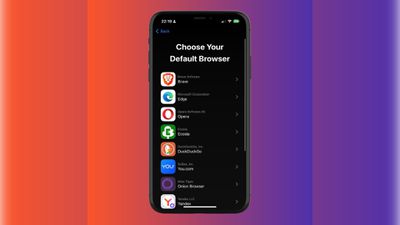Several third-party browser companies have experienced a spike in iPhone installs since Apple made major changes to iOS in order to comply with the Digital Markets Act in the European Union, but many are not happy with Apple's implementation of its default browser choice screen.

In iOS 17.4, released last month, Apple no longer limits EU users to the handful of browser options that iOS currently offers as alternatives in other parts of the world. Instead, users in the EU who open Safari for the first time are presented with a choice screen that allows them to opt for a new default browser from a list of popular alternatives in their country.
The change has led to a sharp increase in third-party browser usage, based on several reports. On Wednesday, Reuters reported that users of privacy-first browser Aloha had jumped 250% in March. The jump in users largely came in France, Belgium (3x growth), Germany, The Netherlands, Spain and Sweden (2.5x growth), and Denmark, Italy and Poland (2x growth).
Aloha browser markets itself as a privacy focused alternative to browsers that earns its money through paid subscriptions rather than selling ads by tracking users. The Cyprus-based company says it has 10 million monthly average users.
"Before, EU was our number four market, right now it's number two," Aloha CEO Andrew Frost Moroz said in an interview with Reuters.
Norway's Vivaldi browser, Germany's Ecosia and U.S.-based Brave have all seen user numbers rise following the new regulation. U.S.-based DuckDuckGo, which has about 100 million users, and its more popular rival, Norway-based Opera, have also reported substantial increases.
To be eligible for consideration in the alternative browsers list, companies must have the Default Browser Entitlement that is available to developers. Apple also requires that the app has been downloaded by at least 5,000 iPhone users across all 27 EU countries in the prior calendar year. Apple selects up to 11 of these for the browser choice screen in addition to Safari, updating the list once per calendar year.
Google has also updated its Pixel software to show alternative browser choices, and says that new Android devices made by other companies will also display the choice screen in the coming months.
Despite users increasingly choosing alternative options, browser companies have criticized Apple and Google for the slow rollout of the change, and believe it is hampering the migration away from Safari and Chrome. Mozilla, which owns Firefox, estimates that only around a fifth of iPhone users in the EU have received the iOS update, and claims that the rollout is much slower than Apple's previous software updates.
Some alternative browser makers are also concerned that the design of choice screens is sub-optimal at best. For example, Vivaldi CEO Jon Stephenson von Tetzchner notes that Apple's choice screen only appears when iPhone users open Safari, while the list of browsers provides no additional information.
"The process is just so convoluted that it's easiest for (users) to select Safari or potentially some other known name," he told Reuters.
Vivaldi is also unhappy with the design. "The list of browsers does not show additional information and that does not help users to make a meaningful choice," a company spokesperson told TechCrunch. "If the user has already selected a browser of their own choice, the choice screen can actively try to push them away from it, and may not even include it in the list that it presents to the user."
Ecosia has also been critical, and says Apple's implementation involves an "overly complex installation process" and keeps Safari front and center on the user's iPhone Home screen.
The European Commission is currently investigating Apple's choice screen design for suspected noncompliance. The probe is being conducted in consultation with browser companies, who are likely to encourage regulators to push for a stronger implementation to level the competitive playing field.





















